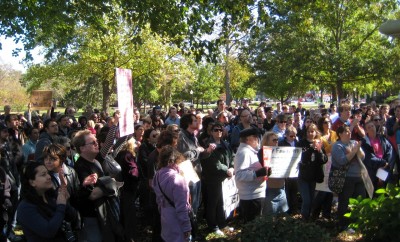I spent the whole decade of the 1990s hoping that the economic upturn would prove that the strategy of letting employees go the instant there wasn’t any work to do was unwise. Surely, I thought, those companies would suffer—missing out on business because they didn’t have the skilled employees to do the work (and screwing up on what business they did get, because rushing to hire new employees would result in picking up some duds).
My hopes remained unfulfilled. Oh, probably plenty of companies did suffer from an inability to hire skilled, reliable workers at reasonable wages. Certainly employers complain that they can’t, especially when they’re lobbying Congress for an expansion of the H1 visa program. But it didn’t matter, because the company’s were profitable. (Profitable companies may do as they please; unprofitable companies must kowtow to the financial markets.)
I’ve written about this before, in a two part series at Wise Bread called “What’s An Employee To Do?” Part 1 laid out the issue in some detail, and part 2 talked about the best strategies for an employee to follow. (There’s actually a lot of opportunity for employees in the current situation, as long as they don’t make the mistake of thinking of themselves as employees.)
Prompted by Tobias Buckell’s recent post Working culture, though, I wanted to talk a little about the broader impacts of the way we’ve come to arrange society, because there were other reasons that employers kept employees on during a business downturn. Business owners kept employees on during a downturn because they cared about them as people, because they were friends and neighbors, because the whole community suffered when one person lost a job.
A small part of the reason that things are different now is that this is less true. Managers are not as likely to live in the same neighborhoods as their employees. They don’t shop in the same stores. Their kids don’t go to the same schools. In any case, the decisions are being made far away. (The local managers were completely out of the loop when the site where I used to work was closed down three years ago.)
But that’s just been an enabler of this shift. The real cause is the behavior of the financial markets, which since 1990 have crushed any employer that tries to resist, by driving its stock price low enough that someone could acquire them and bring in new management—management that would lay off plenty of workers.
This isn’t new, of course. Business owners knew that going public meant putting their business in the jaws of the financial market nutcracker—but they made so much money it was worth it. You occasionally hear about the rare business owner who has declined to go public for just that reason—but you hear about it because it’s rare enough as to be news.
As Toby describes, Germany has structures and institutions in place to support businesses that are small and local. Unions are a big one—including the government support for unions that encourage and enable unions to work together in a block. Also important are rules that lean against market pressures for business consolidation, offshoring employment, etc.
Personally, I used to support a purely market-based approach. That’s why I spent the 1990s waiting for markets to punish the bad actors. I’ve changed my mind. It’s fine to leave the fate of the companies up to the markets, but it unacceptable to leave to the markets the fate of whole communities.
Similarly, I used to support the notion that the right way to address this sort of issue was education (because I believe in free choice). Yes, stuff made by prisoners, slaves, and children costs less. Yes, stuff made by heavy industry costs less if the manufacturers are allowed to wreak environmental destruction all across their supply chain. But surely people would make different purchasing choices if they understood that they’re not only paying to have all this harm done, they’re also putting their friends and neighbors (and themselves) out of work. There again, I’ve changed my mind. It turns out, I simply didn’t understand how much cheaper that stuff was than stuff made locally.
Given the option to have the accoutrements of a middle-class standard of living—clothes, dishes, furniture, gizmos—it’s become clear that most Americans will cheerfully accept any amount of slave labor and environmental destruction (as long as they don’t have to see it) and tolerate the destruction of local businesses and the bankruptcy of their neighbors.
They’ll complain about how it affects property values and how it makes it tough to find a job. But then they’ll take their unemployment check and food stamps and go buy the cheapest stuff they can find at WalMart.
Neither markets nor eduction are going to do the job. The U.S. needs to create institutional support along the lines of what Germany provides.




